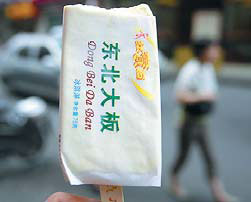Memories you can taste
Updated: 2014-07-21 07:21
By Wang Zhuoqiong (China Daily)
|
|||||||||||
Once-popular local brands reintroduced to a hungry market
What is old is new again.
This summer, local food manufacturers are playing the nostalgia card to attract urban consumers in their 30s and 40s by branding products with sweet childhood memory.
An ice cream bar from Northeast China, packaged exactly like ice cream bars were in the 1980s, has become popular in the past two months in cities like Beijing and Shanghai.
"I don't know why so many friends started talking about Dong Bei Da Ban on WeChat recently," said Du Peng, a 34-year-old white-collar worker in Beijing.
He found the ice-cream bar looks and tastes almost the same as in his childhood.
"It reminds me of many good old things," Du said.
Beverage producers are also trying to revive old brands. A company in Tianjin will bring Shanhaiguan back to the local market on Aug 1. The brand, which dates to 1902 and had its peak from the '60s to the '80s, is a familiar name among older Tianjin residents.
In 1986, the factory formed a joint venture with Coca-Cola, which stopped producing the soda at the end of the 1990s, a time when many old local beverage brands were ended amid fierce competition with international brands such as Coke and Pepsi.
Chen Chong, vice-president of Tianjin Shanhaiguan Beverage, said the company hopes to attract consumers who grew up with the memory of their favorite brands.
"For many people in Tianjin, seeing the brand again is like an old friend returning - with new elements," said Chen.
Dong Bei Da Ban and Shanhaiguan are among an increasing number of Chinese brands that have reinvented themselves.
"Old local brands are cool," said Ben Cavender, an analyst at Shanghai-based China Market Research. The brands have found demand from consumers looking for more options, and the strategy works well because the taste satisfies Chinese consumers, he said.
But other old Chinese brands do not necessarily do well. In the shampoo and soap categories, Chinese consumers are more concerned about function and quality. "They are less likely to believe in Chinese brands in these categories," he said.
Cavender said more Chinese companies are learning to make better products, creating a more competitive market for foreign brands in the future.
Jason Yu, general manager of consumer research company Kantar Worldpanel, said they have observed the re-emergence of some traditional Chinese brands, such as Pechoin cream or Beibingyang soda water.
Those brands have successfully capitalized on consumers' increasing pride in national products and nostalgia, and have transformed themselves in quality and packaging, Yu said.
They are typically good at distributing through non-mainstream channels, according to Yu. However, Yu said, it is difficult to say if those brands as a group will pose a tangible threat to foreign brands because they are still playing to a limited "niche" market.
Li Xiang and Kang Jia contributed to this story.
wangzhuoqiong@chinadaily.com.cn
|
Dong Bei Da Ban is very popular this summer in big cities like Beijing. Weng Lei / for China Daily |
(China Daily 07/21/2014 page1)
Today's Top News
Int'l investigation team on MH17 formed
Meat supplier of McDonald's, KFC suspended in Shanghai
Gaza death toll pass 100
Lunar rover is 'awake'
Burning wreckage, bodies scattered after jet downed
Xi makes plea for 'cyperpeace'
China's GDP growth 'in range'
Israeli forces roll into Gaza
Hot Topics
Lunar probe , China growth forecasts, Emission rules get tougher, China seen through 'colored lens', International board,
Editor's Picks

|

|

|

|

|

|






